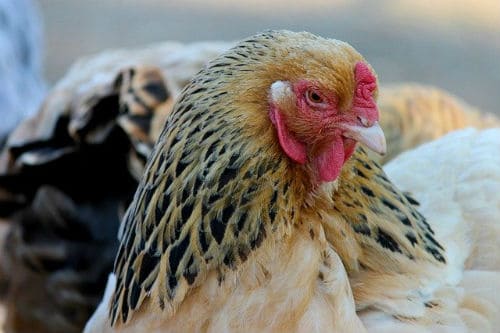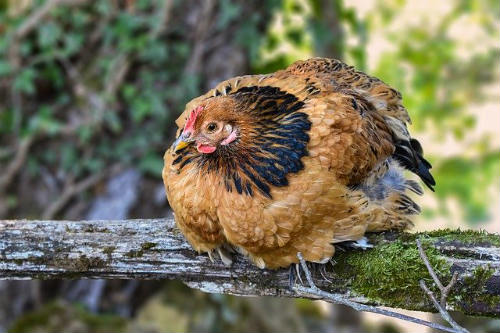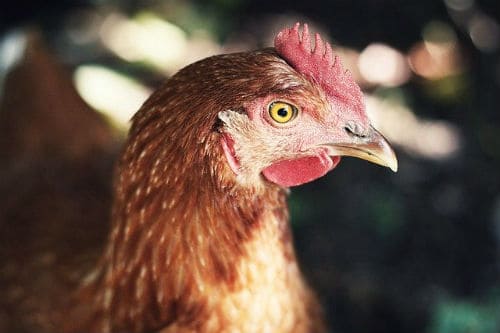As a species, chickens tend to be quite lively. They spend a lot of time scurrying about for food. If you notice that your chicken seems to lack of energy, then it might be lethargic, which could indicate a serious problem.
What is Lethargy?
Like in humans, a lethargic chicken describes a chicken that lacks energy. They may sleep more often than other chickens. They may spend less time scurrying around in search of food. While it isn’t uncommon for hens to rest and nap, they do tend to spring up quickly if they’re startled.
A lethargic chicken won’t move much at all if it’s disturbed from its sleep. If you believe that your chicken may be lethargic, then it may due to a number of diseases or conditions.
Signs of a Lethargic Chicken

What’s the difference between a healthy chicken and a lethargic one? Check out some of these signs to determine if your chicken is suffering from lethargy.
1. Not Foraging
Chickens spend most of their time foraging for food. They travel across their pen looking for crumbs, worms, and seeds to eat. Now and then, they might take the time to return to the coop to rest. However, they’re usually active.
A sign that your chicken may be lethargic is if it doesn’t forage very often or at all. Instead of joining the others in searching for seeds, they instead remain prone on the ground. They may not even leave the coop.
While naps are common, a lethargic chicken takes that to the next level. They don’t have an interest in getting up and foraging for food. Even if they’re hungry, they’ll remain still and prone.
2. Difficulty Walking
No doubt you’re familiar with how a chicken struts around. They tend to dart their legs forward. Now and then, they may flap their wings for balance or agitation. Those are all signs of a healthy chicken being mobile.
Yet a sign of a lethargic chicken is one where they have difficulty in walking. They may even have problems standing. Whenever they try to take a step, they may be unbalanced, or their legs might become bowed.
They may even appear slightly disoriented or unbalanced. You may notice that they have difficulty during the actual process of standing up. They’re unable to lift their weight up on their legs.
3. Solitary

Chickens tend to stick together. They’re safer in larger numbers. However, a lethargic chicken tends to prefer its solitude. It won’t join the others in the pecking order. Nor will it join them at all.
Now and then, it might manage to make its way to the others to eat. Yet it tends to prefer its solitude. It may nest away from the others and even try to food elsewhere. So, if your chicken isolates itself from the others, then it could be due to lethargy.
4. Head Droop
When your chickens rest at night, they tend to sleep in a particular way. Anything outside of that way could be indicative that your chicken has lethargy. Most lethargic chickens typically sleep with their heads drooped or tucked into a wing.
It may appear as though they can’t keep their heads lifted up. The energy that it requires to keep a good posture may be too much for them.
5. Unaware of Surroundings
One last sign that your chicken may be lethargic is if it seems oblivious to its surroundings. A healthy chicken is incredibly aware of what is going on around it. They’re constantly in search of danger or anything that might threaten them.
A lethargic chicken is either unable to be aware of their surroundings or they don’t have the energy to react to stimuli or dangers. This means that you can easily approach a lethargic chicken without it running off.
You can also handle a lethargic chicken rather easily. Because they’re not too aware of their surroundings, they may not realize that you’re lifting them up and out of the chicken coop.
Finally, it may even have a difficult time opening its eyes. This adds to its inability to react to its surroundings.
Reasons for Lethargy

A physical examination may be all you need to determine the cause of the lethargy in the chicken. Sometimes, even something as minimal as the change in temperature of the area can affect a chicken. If your chicken is too cold or too hot, it could become lethargic.
In that case, all you need to do is correct the temperature around the chicken to make it comfortable once more. Its energy will rise back up, and they’ll be back outside with the other chickens foraging.
A healthy chicken is constantly eating and drinking water. If your lethargic chicken isn’t eating or drinking, then it could be due to a blockage. Check the chicken’s throat, intestines, crop, vent, and oviduct.
Hens can also become egg bound which blocks their digestive system. This prevents them from being able to expel waste and thus keeps them from eating. Once the egg is removed, the chicken should return to its normal eating ways, and its energy should return to what it was.
Chickens can also acquire diseases. A vet can help you determine what disease is ailing your chicken and give you the necessary antibiotics or treatments for the chicken.
Steps to Take with a Lethargic Chicken

If you suspect that one of your chickens is lethargic, you should first keep a close eye on it. Look for the signs listed above to see if it’s just being lazy or does, in fact, have a serious problem.
After you have determined that your chicken is lethargic, then you should isolate it from the rest of the chickens immediately. Whatever is causing its lethargy could be contagious and spread to your other chickens.
Having a hospital cage is important for any chicken owner. This allows you to keep a sick chicken away from the others whilst also ensuring that the sick chicken is safe and comfortable. Your lethargic chicken should be placed in this coop. The hospital cage should be in a draft-free area with electricity.
A heat lamp should also be included in the hospital cage to make it a comfortable temperature for the chicken.
Once you’ve separated the lethargic chicken, you should examine it from head to toe. You want to look for any wounds that it may have like bites from parasites, snakes, or any other kind of animal that might have poisoned it.
You’ll want to check for weight loss. You can inspect the impacted crop to see if something is wrong with what you’re feeding to the chickens. Although if the rest of your chickens appear healthy, the feed likely isn’t the problem.
Another aspect to examine is the chicken’s droppings. You can inspect those to see if they appear healthy or if they’re loose or contain anything worrisome like blood or parasites.
One of the most important things you can do to help your chicken recover is to move them to either a cool or warm room, depending on if they’re cold or hot. Then you should monitor their feeding.
A lethargic chicken may not want to drink from a dish. You can carefully drip a few drops of water down their throats to ensure they’re taking in some water. You should also help encourage them to eat. You may want to offer a soupy kind of feed that is easier for them to eat.
That soupy feed should also have some vitamin or electrolyte water added to it.
Finally, you should take some droppings to your vet to check for other parasites and diseases. With a bit of care and perhaps some medicine, your lethargic chicken can return to its normal state of health in no time.





How do I check it’s colon for eggs? My hand won’t fit up there.
My chicken is lethargic but is eating and drinking like normal what is wrong?
Mine too, it still eats and drinks normally. But less. Even foraged with it’s peers. The only problem is it’s not as energetic as it used to be. It sleeps a. lot more too. It’s rather quiet now than before.
Did you ever figure out what was going on with your chicken? We have one that is seeming similar to this.
Maybe it is just a little bit cold
Same, I think the cold spell we are having might be affecting her.
Hello! So my 2 month old silkie mix chicken has had these exact symptoms of being lethargic and before all these symptoms showed up this chicken was pecked really hard in the head by our other chickens so we took her inside to keep her safe and heathy then she wouldn’t eat or drink that’s our main issue so we’ve been trying to force feed her but she’s getting skinner by the minute could you help us getting her to eat and drink again? We’ve given her vitamin water, a electrolyte mixture, eggs and yogurt but she still won’t even peck at her food or water we’ve even dipped her head in her food and water multiple times.
An interesting article!!!!
My sons chicken is sleeping non stop and is having a hard time, we force her to eat and drink and she does it while she sleeps (Unless she’s blind).Where isolating her from the other three to insure that they won’t be lethargic to. We are doubtful about her living another night, and sadly her only reaction is her tucking her head in to a wing and sleeping.
She probably had an illness. If signs of digestive system illness don’t show in their poop then the disease is in the respiratory system.
Mycoplasma is one respiratory diseases that can get to your Chicken and it’s way bad coz it blocks the nose, the eyes swell and close and the leg joints swell making walking difficult. You may know it from hearing snoring noises or when your hen is awake she has her beak slightly open to breath but sometimes this signs are not easy to find.
Just consult a vet when such a thing occurs.
i just bought this baby chick and one night she got in there water bowl and got cold i managed to get her back to her normal temperature and she was doing fine all night and was walking and eating but now she’s been sleeping won’t touch her food or water and is having almost all these symptoms. someone help me please i can’t separate her from the others bc they are inside bc of how cold it’s been getting and i don’t have another heat lamp or box. someone let me know how i can get this baby to eat again
give her some garlic water that might help
All the questions are the same as mine. I have two roosters and one small (peep) that are not acting the way a normal chicken would. I have 4 in the house and don’t know what to do.
If it ever happens again please rap her in a blacket for 24 hours. That is rap her in a blacket and give her food and drink while rapped.
The cold got into its body and froze all functions even while it was in room temperature.
I have had similar incidence but mine alway recovered since i would also sit with them rapped under the sun, so that the blacket would absorb the heat and warm it up